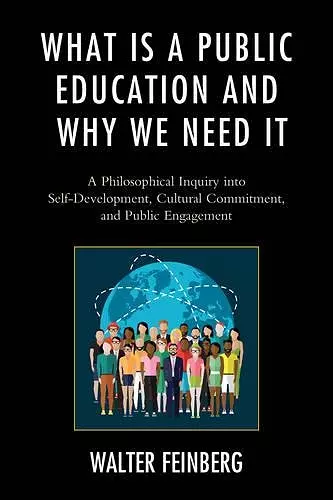What Is a Public Education and Why We Need It
A Philosophical Inquiry into Self-Development, Cultural Commitment, and Public Engagement
Format:Hardback
Publisher:Lexington Books
Published:28th Jan '16
Currently unavailable, and unfortunately no date known when it will be back
This hardback is available in another edition too:
- Paperback£39.00(9781498517249)

The unique mission of a public education is to reproduce a civic public. For the most part this will not happen in a vacuum and requires specific institutions, the most prominent of which are the public schools. Publicly supported schools have other functions as well. They socialize, train, produce a workforce, and, hopefully, promote individual growth and autonomy. Walter Feinberg argues that while all of these functions may be carried on by private or religious schools as well, public schools should have the additional responsibility of reproducing a civic public for a diverse pluralistic society. As Feinberg demonstrates, the problem is that in the context of neoliberal ideology, where all the other educational functions are reduced to economic ones within a market context ruled by competition—nation to nation, state to state, community to community, school to school, teacher to teacher, student to student—the public function becomes less and less central and more and more difficult to carry out. What Is a Public Education and Why We Need It suggests ways to change this by bringing the idea of a true public education back into focus.
It is good to see a defense of public education. Education philosopher Feinberg distinguishes between public schools and public education. The latter is 'the process through which public values are shaped and transmitted,' those values being standards of behavior scrutinized and refined, 'compatible with core social ideals,' that 'shape civic judgement and guide individual behavior.' Public schools should do this, but other schools may do it too. (Feinberg acknowledges that schools have other purposes as well.) He examines the concepts of education and culture and the basic function of a public school to produce a public through communication, and proposes that the educator’s task is to prepare a public to reflect on the present and engage a future that is not yet fully comprehended. And he suggests some curricula, pedagogical, and financial ideas to advance public education. Feinberg is a good philosopher. His extensive opening remarks admirably explain the role of philosophy in guiding the work of education. Especially useful is his idea that philosophy is best understood as 'a street discipline,' that is, 'grounded in the concerns of everyday people.' Summing Up: Recommended. Upper-division undergraduates through practitioners. * CHOICE *
Feinberg is writing here, like Dewey did at intervals throughout his career, for a wide audience: this is a short book working to convey a sophisticated argument in an accessible way. Far more succinctly than did Democracy and Education, Feinberg’s new book explains to lay readers why our society depends upon public education for its continuance as a democratic society. . . .Feinberg prompts us to think about the public aspects of education, leading us to consider both what our shared values are and how we foster social growth and change in those values. He valiantly balances the tension between complexity and clarity, between addressing a wider audience, who may at times have difficulty following his foray into theories of self and self-development, and the philosopher, who may yearn for him to elaborate in more areas, such as ‘deep’ pluralism. Yet, Feinberg succeeds in both helping the broader audience consider important, neglected meanings and aims of public education and reminding philosophers of education of the most central pragmatist arguments for an educated public and what exactly that may mean. In doing the former, he performs the public intellectuals’ job to make complex thoughts accessible to a more general audience—in this case, the important distinctions between education and schooling—without sacrificing rigor. In doing the latter, he contributes to contemporary philosophical work attempting to rearticulate and reconstruct public aims in education. * Philosophical Inquiry in Education *
What is a Public Education and Why We Need It is a wise and wonderfully clear essay on the vital necessity of public education in the USA. This is much more than a book for other scholars. Every citizen should read it. -- Eamonn Callan, Stanford University
ISBN: 9781498517225
Dimensions: 240mm x 158mm x 15mm
Weight: 349g
154 pages